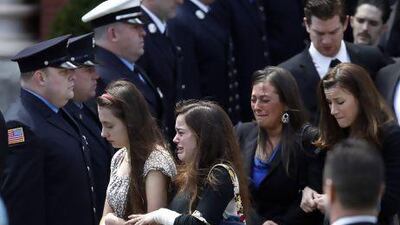NEW YORK // The two brothers accused of bombing the Boston Marathon probably acted alone, not at the behest of a foreign or domestic militant group, and appear to have been inspired by extremist ideology, US officials said.
The blasts killed three people last week and the suspects also shot dead a policeman. Since the attacks, officials have turned their attention to trying to understand what motivated the Tsarnaeva brothers.
Tamerlan Tsarnaeva, 26, was killed during a shoot-out with police on Friday but his brother Dzhokhar, 19, answered law enforcement officials' questions from his hospital bed in writing at the weekend, officials told Associated Press.
With gunshot wounds to the head, throat and legs, among other injuries sustained during two shoot-outs with police and perhaps a suicide attempt, Dzhokhar was sedated and on a ventilator at the weekend.
During the initial interview with FBI agents, which is not admissible as evidence in court, Dzhokhar said Tamerlan, had masterminded the attacks out of a desire to defend Islam, an official told CNN.
FBI officials said yesterday that Tamerlan frequently looked at extremist propaganda, including Inspire magazine, an English-language online publication aimed at aspiring lone-wolf terrorists.
Dzhokhar has acknowledged his role in the bombing, according to The Washington Post. The newspaper also reported that Dzhokhar had said that wars in Iraq and Afghanistan had motivated him and his brother to carry out the attack.
By Monday, Dzhokhar had been read his rights and was officially charged with using a weapon of mass destruction resulting in death, among other crimes, during a bedside court proceedings.
The claim that Tamerlan was the motivating force in the crime bolstered the narrative that has emerged in the days since then of an alienated and angry young man whose life in the US was faltering and who became enthralled with a radical interpretation of Islam.
The exact formula of personal psychology and external political and religious influences that led to Tamerlan's radicalisation, and whether it occurred before, during or after a six-month trip to Dagestan and Chechnya last year, will probably never be known with certainty.
"Profiles are almost impossible to draw," Rafaello Pantucci, who studies radicalisation at the United Royal Services Institute security think tank in London, told Reuters.
After following his parents and younger brother to Cambridge from Dagestan in 2004, Tamerlan finished high school and trained with his father as a boxer, becoming one of the best amateurs in the region. But soon his boxing career stalled, as did his interest in engineering classes at a local community college.
According to members of his extended family, sometime in 2007 the Tsarnaev household began to splinter under the weight of the deferred dreams and realities of life in America.
Perhaps the spark that ignited the family discord was the Tamerlan's growing religiosity at the prompting of his mother, Zubeidat Tsarnaeva. During an interview in her home in Dagestan, she told TheWall Street Journal that she urged Tamerlan to become more religious because she worried about his lifestyle of womanising, and use of marijuana and alcohol.
"I'm telling you, something turned," a high school friend, Luis Vasquez, told The Journal. "And it was dramatic."
In 2010, Tamerlan met and married Katherine Russell, now 24, an American who was studying in Boston who converted to Islam before their marriage. They had a daughter soon after.
Katherine lived with the brothers in their Cambridge apartment during the time leading up to the bombings, but her lawyer said she knew nothing of the plot and her family released a statement saying they "never really knew Tamerlan Tsarnaev". The FBI is in discussions with her lawyer about how to proceed with questioning.
Her lawyers say she is doing everything she can to assist authorities. Soon after his marriage, Tamerlan went on a six-month trip to Dagestan, to visit his father and other relatives. Before he left, Russian authorities had asked the FBI to investigate Tamerlan for alleged links to militant groups in the region, although it is not clear what intelligence prompted this.
The FBI found no reason to suspect Tamerlan, and he embarked on his trip, though his father said he mostly stayed at home.
Upon his return Tamerlan appeared more outwardly religious in his appearance, growing a beard and replacing his flashy western clothes with "white linen robes", according to The Boston Globe.
He also became confrontational at his local mosque on at least two occasions, according to congregants and a spokesman at the Islamic Society of Boston. Last November he interrupted a preacher who was encouraging worshippers there to celebrate national US holidays, saying that this was not allowed in Islam. Then in January, during another Friday sermon, he stood up and called the imam a "Kafir" for praising the US civil rights leader Martin Luther King junior The other congregants shouted Tamerlan down.
tkhan@thenational.ae
twitter: For breaking news from the Gulf, the Middle East and around the globe follow The National World. Follow us

